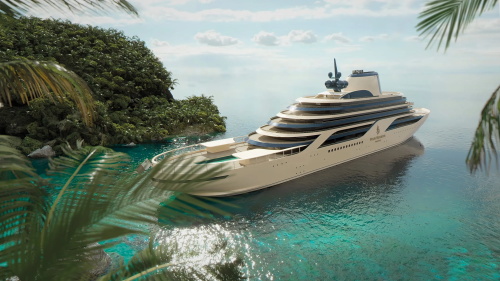Travel Revenge Spending Peaks: Cruise Lines vs. Luxury Hotels

Since the outbreak of COVID-19 in 2020, the global travel industry virtually came to a standstill. However, as the pandemic gradually came under control, vaccinations became widespread, and countries began easing travel restrictions, a wave of "revenge spending" rapidly swept through the global tourism market. Starting in 2021, this trend manifested not only in a surge of tourist numbers, but more notably in an upgrade of spending patterns—people not only wanted to travel again but wanted to do it in style, stay in luxury, and seek elevated experiences. Against this backdrop, cruise lines and luxury hotels emerged as two major winners, quietly engaging in an intense rivalry over who better represents the future of high-end travel.
Post-Pandemic Travel Recovery: From Local to Global
The path to tourism recovery followed a gradual, expanding trajectory—from local to global, from cautious experimentation to full-blown rebound:
- Early 2021: Domestic travel restrictions were lifted first in Western countries. The U.S. saw a surge in road trips, while Europe embraced the trend of “staycations.”
- Late 2021: As vaccine coverage improved, international tourism began to rebound. Destinations like Dubai and the Maldives led the recovery.
- Summer 2022: Europe and North America fully reopened borders. International flights returned to over 70% of pre-pandemic levels. Coastal regions like the Mediterranean and Caribbean were overwhelmed with visitors.
- Late 2022: Mega-events such as the FIFA World Cup in Qatar boosted tourism in the Middle East.
- Early 2023: The Asia-Pacific region followed suit, with China, Japan, and South Korea easing inbound travel rules, accelerating regional tourism recovery.
As travel boomed again, consumer mindsets shifted. It was no longer about just going somewhere—but about going well: staying luxuriously, eating exquisitely, and indulging deeply. Travel spending skewed increasingly toward premium experiences.
The Cruise Comeback: A Floating All-in-One Luxury
Cruise lines, once brought to a complete halt during the pandemic, staged a strong comeback by 2023. By 2024, cruise tourism had not only regained its former glory but also attracted a younger generation through branding around convenience, luxury, and "one-stop" experiences.
According to the Cruise Lines International Association (CLIA), cruise passenger numbers are projected to grow by 12% compared to 2019 levels by the end of 2026. Royal Caribbean Group reported $16.5 billion in total revenue and $2.9 billion in net profit in 2024, while Carnival Cruise bookings jumped 25% year-over-year, hitting record highs during peak seasons.
What makes cruises so appealing is the all-inclusive “effortless indulgence” they offer: board the ship and enjoy lodging, fine dining, entertainment, and sightseeing—all bundled together. From spa sessions and sunbathing on deck to high-caliber performances and global cuisine, modern cruises deliver a luxury lifestyle afloat.
Notably, the average cruise passenger is getting younger. Royal Caribbean’s 2024 booking data showed the average passenger age dropped 2.6 years compared to 2019, with millennials and Gen Z accounting for a growing share. Cruises are no longer exclusive to retirees—they are now a trendy vacation choice for younger travelers.
To further compete in the high-end market, cruise lines are ramping up innovation. Royal Caribbean introduced "Celebrity River Cruises" aimed at refined inland travel. MSC Cruises has introduced a new ultra-luxury brand, Explora Journeys, committing €2.5 billion to build a fleet of next-generation ships. With this move, the company seeks to redefine high-end cruising by transforming the voyage itself into a central part of the travel experience. No longer just a means of getting from one place to another, these cruises are designed to serve as exclusive, floating destinations in their own right.
Luxury Hotels: Adapting Tradition with Innovation
Faced with the rising appeal of floating luxury, high-end hotels aren’t standing still. In 2024, as global tourism surged, the hotel industry enjoyed a renaissance.
InterContinental Hotels Group reported $1.124 billion in operating profit for 2024, up 10% year-on-year. Hilton’s net income reached $1.539 billion. Marriott opened 123,000 new rooms and signed contracts for another 162,000—both record highs. These figures reflect not just a strong recovery, but a booming demand for upscale accommodations.
Yet rather than merely “recovering,” hotels are “evolving”—shifting from reliance on location and brand reputation to focusing on personalized services and sensory experiences.
For example, more luxury hotels now offer private butlers and customized itineraries. Guests can choose everything from pillow firmness to room fragrances, with even sleep habits being accounted for. In addition, hotels are teaming up with designer brands to offer exclusive bath products, fragrances, and attire—embedding “olfactory memory” and aesthetic appeal into the guest experience, creating immersive luxury.
While luxury hotels typically command higher per-night spending ($500–$1500) and profit margins of 20–30%, they also face higher operating costs and greater challenges in customer acquisition—especially in an era where expectations for innovation and service personalization are constantly rising.
Who’s Winning? Perhaps the Answer Lies in Hybridization
In the showdown between cruise lines and luxury hotels, who’s the ultimate winner?
The answer may be: neither, and both. Rather than a binary choice, the future seems to lie in integration. As cruises evolve to offer hotel-like experiences, some top hotel brands are sailing out to sea.
In 2022, Marriott’s Ritz-Carlton Yacht Collection debuted its first vessel Evrima, kicking off a wave of luxury hotels entering the cruise space. Four Seasons, Orient Express, and Aman have since announced their own luxury yacht ventures. By leveraging loyal clientele and elite service standards, these brands are transplanting “land-based luxury” into maritime travel, unlocking new growth avenues.
Cruise-hotel hybrids offer distinct advantages:
- Mobile experience: Flexible itineraries allow travelers to visit multiple countries in one trip.
- Transparent pricing: Most cruises use all-inclusive pricing, offering strong value.
- Controlled service: Unified onboard management ensures consistent service quality.
Such offerings are fast attracting affluent travelers who value quality and want efficient, curated vacations. In Western markets, this trend of "hotels becoming cruises" is booming—and the hotel membership systems benefit from broader consumer touchpoints and increased loyalty.
Luxury Is No Longer a Format, but an Experience
Whether it’s a golden empire afloat or a gleaming palace on land, the cruise vs. hotel rivalry ultimately reflects a deeper trend: people are moving beyond where they go, to how they go, how they stay, and how they experience.
Luxury today is no longer defined by marble floors or star ratings, but by perceived value and lasting impressions. Whether cruise or hotel, the real winners will be the brands that understand traveler psychology and can redefine the value of a journey through rich, meaningful, personalized experiences.



